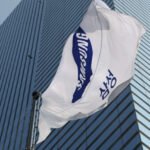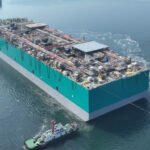SK Energy’s facility for SAF commercial production (Courtesy of SK Innovation, the refiner’s parent)
SK Energy Co., South Korea’s largest oil refiner, is set to start commercial operations of the country’s first dedicated production line for sustainable aviation fuel (SAF) next month to meet the growing demand for the eco-friendly fuel.
The refiner said on Wednesday it plans to manufacture low-carbon products including SAF by putting bio raw materials such as used cooking oils and animal fats, as well as petroleum ingredients at the same time into the existing production line through a co-processing method.
Co-processing involves the use of renewable feedstock in conventional fossil fuel units, which allows existing refineries to seamlessly integrate renewable feedstocks into their production processes without the need for extensive infrastructural changes.
SAF is an alternative fuel made from non-petroleum feedstocks that reduces emissions from air transportation.
SK Energy, a unit of the country’s top energy company SK Innovation Co., installed a 5-kilometer pipeline to a bio-material storage tank to supply the renewable feedstock to petroleum product manufacturing processes for continuous SAF production.
TOUGHER REGULATIONS
“We can immediately supply SAF to airlines when they need to comply with mandatory SAF blending policies in a preemptive move as we can keep producing SAF at the country’s first co-processing facility,” said Hong Kwang pyo, SK Energy’s head of strategy operation division.
The government plans to require all international flights departing the country to use fuel containing 1% SAF from 2027 when participation in the Carbon Offsetting and Reduction Scheme for International Aviation (CORSIA) developed by the International Civil Aviation Organization (ICAO) becomes mandatory.
The CORSIA is a carbon offset and carbon reduction scheme to lower CO2 emissions for international flights and curb the aviation impact on climate change.
Other countries have already introduced similar regulations. The European Union required all flights from the bloc to mix 2% SAF in 2025.
SURGING DEMAND
The global SAF was forecast to soar to 18.4 million tons by 2030 from only 240,000 tons in 2022, according to The International Air Transport Association (IATA).
SK Energy is considering the introduction of a dedicated facility for SAF production if demand is strong enough.
“We will consider raising SAF output after closely watching SAF policies at home and abroad, as well as changes in demand,” Hong said without details.
The company plans to supply SAF to Korean Air Lines Co. from early next year. The country’s top carrier started using the alternative fuel for a passenger flight to Japan late last month, while other local airlines plan to follow suit.
The SAF mass production is expected to allow SK Energy to complete an entire SAF value chain, which includes raw material procurements, manufacturing and sale.
By Hyung-Kyu Kim
khk@hankyung.com
Jongwoo Cheon edited this article.














